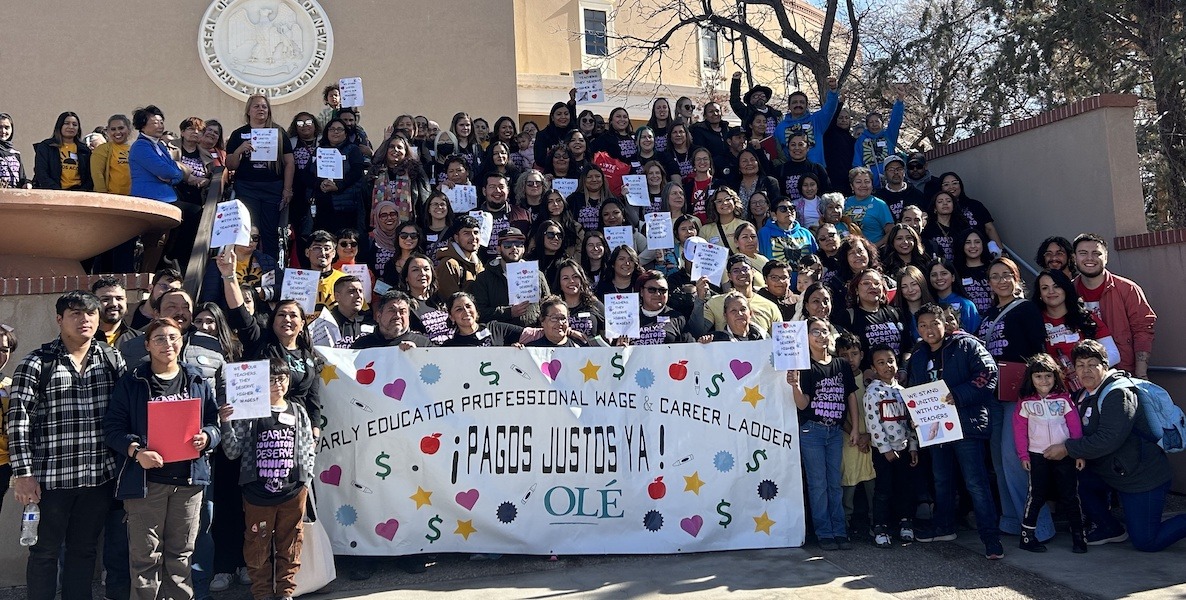Patricia Bustillos works part-time cleaning offices, volunteers at a community advocacy group — and is often called on to care for her two youngest grandchildren, both infants, one who is only six weeks old. It’s no wonder the mother of four children and grandmother to nine is exhausted at the end of the day — and has little time to care for herself.
“It’s difficult for me,” Bustillos said via a translator. “Starting over with a baby, it’s difficult.”
The high costs and lack of availability of childcare has made such difficulties an increasingly common struggle for families. There are 39,400 fewer childcare workers in the U.S. today than there were at the outset of the pandemic, per Center for American Progress data from September 2023, while costs remain prohibitive for low- and even middle-income families. In Pennsylvania, full-time infant care averages between $9,000 to $14,000 per year and $7,000 to $10,000 per year for toddlers and preschoolers.
Despite the challenges faced by Bustillos and her family, in some ways they are luckier than many. They live in New Mexico, which has become an unlikely pioneer in childcare affordability. Last year, two of Bustillos’ grandchildren were able to take advantage of a free childcare program the state created to reduce the financial strain on families.
The efforts like those in New Mexico do more than help with affordability, however. With numerous studies linking the availability of childcare to caregivers’ health outcomes, such policies have also proven to provide positive effects in improving health, particularly for women, who tend to take on most childcare responsibilities.
Bringing affordable childcare to almost every resident
New Mexico started on the road to making childcare more affordable for families in 2019, when the state government created the Early Childhood Education and Care Department (ECECD), a cabinet-level agency that oversees state programs for children under age five.
The state initially used pandemic relief funds to launch many of the programs before passing a bill in 2020 that created the Early Childhood Education and Care Fund, which helps fund the department using taxes from oil and gas companies.
The state needed the investment. For years, advocacy groups like OLÉ, where Bustillos volunteers in her free time, had been trying to get New Mexico legislators to prioritize addressing child-related issues. A year before the ECECD was created, the state ranked worst in the nation for child well-being, according to the Annie E. Casey Foundation’s KIDS COUNT report.
In 2022, NM Governor Michelle Lujan Grisham launched a program that would provide free childcare for families who earned up to 400 percent of the federal poverty level. For a family of four, that means they could make up to $111,000 and still be eligible for the benefit. For those who qualify, a monthly payment is made directly to their childcare provider.
“Sometimes there are difficult choices to be made between whether you can afford to pay your rent and pay your childcare and get food on the table to feed your family, and your own ability to have health insurance for yourself.” — Kristen Rotz, president of United Way of Pennsylvania
Later in 2022, 70 percent of voters helped make the program permanent by voting for a constitutional amendment that guarantees the right to early childhood education, a decision that allowed the state to help fund its affordable childcare initiatives through its Land Grant Permanent Fund, which is funded primarily through oil and gas leases and royalties. “[It is] voters in New Mexico who really said, we value early childhood,” says Sara Mickelson, deputy secretary of the state’s ECECD.
On average, 18,423 children had childcare paid for through a monthly subsidy each month as part of the ECECD programs in 2022, the most recent year for which data is available.

New Mexico’s program isn’t perfect. Like other places, the state is facing an early childcare educator shortage which can make it difficult to access care. Bustillos’ infant grandchild is on a waiting list for centers that care for young infants.
To help address the issue, this year the New Mexico Legislature directed $15 million from the state’s New Early Childhood Trust Fund toward raising the wages of childcare workers who are most in demand, those who work with infants and toddlers, over the next three years.
The connection between childcare and women’s health
Women’s health wasn’t necessarily the top rationale for New Mexico when it decided to make childcare more affordable. But investing in families and their economic futures has long been shown to provide knock-on benefits for health, especially for women, who tend to take on the majority of child rearing duties in households.
First, there’s the way increased economic opportunity can positively impact health. Fifty-seven percent of Americans under 65 get their health insurance through their jobs, Vox reported last year. To get those kinds of jobs, parents often need to work full-time — and it can be difficult to hold down a full-time job if you’re scrambling for childcare.
Parents who work regular hours are also more likely to have funds to help weather a health emergency. “Sometimes there are difficult choices to be made between whether you can afford to pay your rent and pay your childcare and get food on the table to feed your family, and your own ability to have health insurance for yourself,” says Kristen Rotz, president of United Way of Pennsylvania, which has advocated for affordable childcare policies in the state. “If you don’t have health insurance and you have an emergency, obviously, you could face some pretty devastating financial consequences.”
New Mexico’s affordable childcare program has helped increase the number of women with young children in the workforce. Before these programs were implemented, labor participation for women with young children in the state was below the national average of 67.9 percent. Today, 77.8 percent of that population is working, a spokesperson for the ECECD said.
Other parents in New Mexico have taken advantage of the program so that they can go back to school and earn degrees in order to get the kinds of jobs that offer good health insurance. “One of the things that we hear around the state is, I was able to go back to school,” Mickelson says. “They’re really getting this autonomy, this choice for themselves to pursue those careers.”
Though much of the data collected so far about New Mexico’s program focuses on childhood development, not caregiver health, national studies have repeatedly linked lesser health outcomes to the lack of childcare. One survey found that 14 percent of all women — and 17 percent of low-income women — have delayed getting healthcare because they had trouble getting childcare.
Advocates say policies like those in New Mexico also help reduce family stress by alleviating parents’ need to scramble for care from family or friends while they are at work. “Families are not dealing with the chronic stress that comes from that uncertainty or financial instability; [it] really results in better health outcomes,” says Jacob Vigil, deputy policy director with the advocacy group New Mexico Voices for Children.
Parents in New Mexico have taken advantage of the program so that they can go back to school and earn degrees in order to get the kinds of jobs that offer good health insurance.
Affordable childcare in PA?
New Mexico is not the only state that has implemented policies to make early childhood care and education more affordable. Washington state is providing free preschool to low-income families. In Kentucky, state childcare workers are eligible to receive free childcare regardless of their income. As in New Mexico, these programs are often started with the hope of addressing the immediate financial burden of childcare, though they can have ripple effects for women’s health.
In Pennsylvania, the Child Care Works subsidizes some of the cost of childcare for low-income families, though participants have a copay. To qualify, a family of four needs to make less than $62,400 a year, and each adult family member must work at least 20 hours per week (or 10 hours per week if they’re enrolled in a qualified training program).
In December, Governor Josh Shapiro signed an executive order reestablishing the Pennsylvania Early Learning Investment Commission. The goal is to reinvigorate public-private partnerships for the purposes of making policy recommendations around early childhood learning and workforce development.
As elsewhere, activists in Pennsylvania see two primary issues for childcare in the state: the high cost and the lack of availability, driven by a worker shortage. “This historic workforce crisis in the childcare sector is really harming parents’ ability to find childcare,” says Steve Doster the director of Mission: Readiness in PA, an organization that has helped advocate for more affordable childcare policies as part of the Start Strong PA Campaign.
In Pennsylvania, 28 percent of households are what the United Way calls ALICE homes — Asset Limited, Income Constrained, Employed. ALICE families are those where parents or primary caregivers work and earn more than the federal poverty level, but only enough to live paycheck-to-paycheck. For a family of four, that means earning about $65,796.
“Childcare is the most expensive element of a survival budget,” says the United Way’s Rotz. “They’re doing all the things they need to do to try to provide for their families, but they’re still not earning enough to afford just the basics for their household.”
Single, female-led households are the largest portion of ALICE households, Rotz says. These are mothers who need affordable childcare and who are likely to skip doctor’s appointments due to a lack of help.
As part of their advocacy efforts, the United Way makes videos featuring ALICE parents explaining their struggles. Many talk about their health in tandem with their need for childcare help.
“I am a disabled veteran. I am a full-time student. When my husband lost his job, I needed help with daycare,” Vivian, a Bucks County resident, says in one of the ALICE videos.
Unlike many Pennsylvanians, though, Vivian got some help. She received a scholarship from United Way to cover the cost of her childcare, an expense she wouldn’t have been able to manage otherwise. “It is a really stressful thing when you’re a parent and you’re not able to provide for your kid in any type of way.”
This piece is part of a year-long editorial series looking at innovations to address inequities in women’s healthcare, sponsored by Independence Blue Cross.

![]() MORE ON CLOSING THE HEALTH DIVIDE
MORE ON CLOSING THE HEALTH DIVIDE



